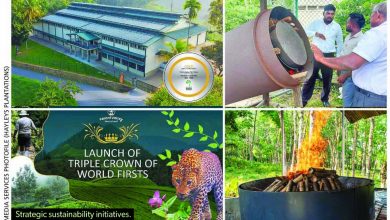YOUTH FORUM
Compiled by Nicola Jayasundera
UNITED WE (SHOULD) STAND
Nuba Riyad would like to see us working together to solve our problems
Q: What’s the good, the bad and the ugly in Sri Lanka?
A: The good in Sri Lanka is its natural beauty and rich diverse culture. The people are warm and welcoming with a strong sense of community. Wherever you go, you feel like you belong. It’s a place that makes you proud to call ‘home.’
The bad is that despite free education and healthcare, these systems often fall short. The Grade 5 scholarship exam, once meant to help intelligent children in rural areas gain access to better schools, now feels like a competition created more for parents than for the children. The pressure on such young children is too much. The growing mental health crisis among young people highlights the lack of adequate support.
Meanwhile, the ugly is the lasting pain we still carry from our past: the conflict, tsunami and Easter Sunday attacks, all of which have left deep scars. Corruption has held us back, though with a new government in place, there’s a renewed sense of hope.
Q: And what are the challenges facing the nation today?
A: The cost of living is high, making daily life challenging. Professionals – especially in medicine – are leaving the country for better opportunities, leading to critical shortages. The education system is outdated, often pushing students into limited career paths.
We also lack robust tech infrastructure and many cases of abuse remain unresolved due to prolonged legal processes.
Q: Do you believe that Sri Lanka will be united one day – and if so, why?
A: Unity is possible. To me, unity means standing together – regardless of religion, language or background – and working as one to solve our problems.
I’ve witnessed unity personally, including how communities come together during festivals or through daily acts of kindness. Yet to truly unite, we must stop allowing the media to manipulate us and think for ourselves.
Q: Where do you see yourself in 10 years?
A: I dream of working in the medical field – something I’ve been passionate about since childhood. I also hope to represent Sri Lanka on the world platform, perhaps through organisations such as UNICEF or the WHO.
I want to inspire others, advocate for what’s right, remain humble and fulfil the dreams of the little girl I once was. As the song by the Banners says: “I wanna be somebody to someone.”
On a personal note, I hope to nurture a family grounded in faith while staying true to my purpose.
Q: And where do you see Sri Lanka in a decade from today?
A: It depends on our leaders – if they step up with purpose and genuinely listen to the people, we can move forward. With the right policies in place, I hope inflation decreases, opportunities increase, and more youth choose to stay and help build Mother Lanka.
Q: Who is responsible for climate change and global warming – and what must be done about it?
A: Richer countries play a major role due to unchecked industrial competition. However, the human population should be accountable.
Change begins with each of us – every small act counts, from avoiding plastic to reducing our carbon footprint. Governments and corporations must prioritise sustainability, and act responsibly.
Q: How do you view the growing importance of social media today?
A: I would have said social media was merely a distraction a few years ago. However, I’ve realised it’s a double-edged sword. On the one hand, it allows people to express themselves, raise awareness and connect globally.
It has helped highlight issues such as child abuse and global injustices – from Gaza to Afghanistan and to Kashmir – even when formal systems fall short or the world turns a blind eye.
However, it also has its downsides such as cyberbullying and algorithms that bury important issues unless they trend. When used responsibly, social media can educate, empower and inspire action.
Q: And where do you see the world in 10 years’ time?
A: I hope for a more peaceful world but today’s power hungry leadership makes that difficult to believe. Misused authority leads to corruption, conflict and division. The biggest future threats will be climate change, inequality and conflict.
While technology such as AI will advance rapidly, we risk losing our identity in a world driven by instant results. Still, I believe in youth led change driven by empathy, unity and strength.









